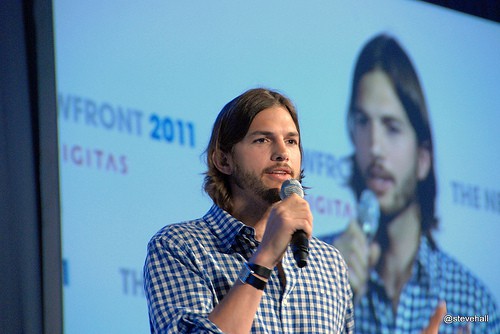Ashton Kutcher managed to pass on three lessons he learned as “Chris,” his name and life before stardom, over screeching adolescents at Teen Choice Awards:
1. Opportunity: “…I have never had a job in my life that I was better than.”
2. Being sexy: “The sexiest thing in the entire world is being really smart, and being thoughtful, and being generous. Everything else is crap…”
3. Living life: “Everything around you that you call life was made up by people that were no smarter than you…”
Video copies of Kutcher’s speech have gone viral, with just one version recieving over 2 million views. It seems odd that Kutcher would choose(of all places) the Teen Choice Awards as a venue to deliver a serious, not one bit wishy-washy, and hardly funny message to teenagers whom, at least as the common script would have it, tend toward the angsty and prefer mindless entertainment. Judging by sheer number of views, dancing kittens, chameleons scared by an iphone (47+million views!), and ridiculous stunts like the cinnamon challenge seem to be more down their alley. So why is Kutcher’s no-nonsense speech so popular?
Writing on churches’ failed attempts to be hip and attractive, Rachel Held Evans has at least one clue: “Having been advertised to our whole lives, we millennials have highly sensitive BS meters, and we’re not easily impressed with consumerism or performances.” Young people like fun and funny, and although that can easily be confused with shallowness or foolishness, young people have an incredible capacity for depth. With a high level of sensitivity to BS, they also know what moves the heart, and when stars get serious, young people who admire them seem to listen.
But do views, “likes,” “tweets” and “retweets” mean people, young and less young, are listening? After watching Glozell choke on cinnamon, we get a good laugh and then we move on to the next funny thing. Inspirational speeches aren’t all that different: we’re filled with zeal, we re-post like crusaders, and then the zeal dies and we move on.
Moving the proverbial millenial from the point where they can distinguish crap from gold is one thing; the challenge comes with taking the next step so that that nugget of internet gold result in concrete action. Revolutionizing “sexy” so that it signifies intelligence, kindness, and hard work requires creativity and imagination–the hard work–that a “retweet” or re-post simply does not. The work can begin there, but that’s only a beginning.
***
Cover Photo courtesy of flickr user Digitas Photos


